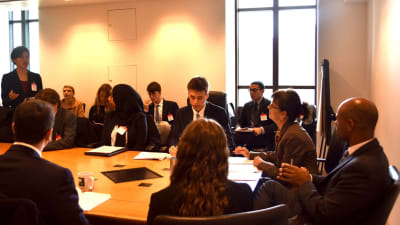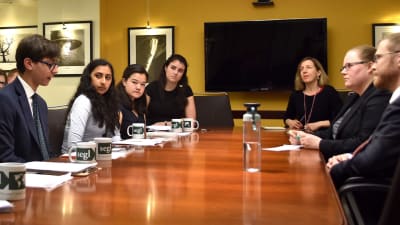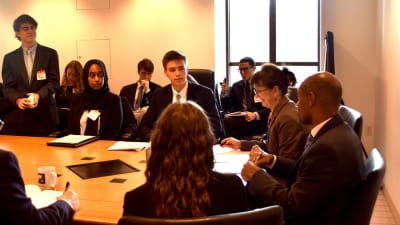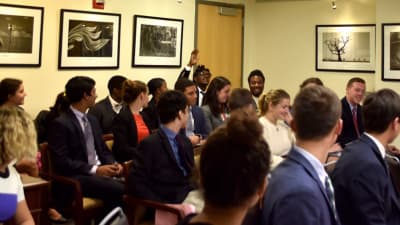Fall 2017 presents policy document at State Department; Peruvian Embassy
Are you ready to testify before Congress? To argue before the Supreme Court? To defend your PhD thesis? After the past few weeks, each of our students is more prepared for these challenges. The reason? Our capstone collaborative policy document experience.
The collaborative policy document (or “CPD,” as our students call it) is one of SEGL’s most difficult challenges. Each SEGL cohort must select a current international crisis, research that crisis and collaboratively craft a 40-page scholarly document which is then presented and defended in front of real-world policymakers.
This semester chose deforestation in the Amazon River Basin as its topic. Few environmental issues attract as much attention, yet there are strong competing interests that make this problem more intractable than it might seem.
After making this decision, the students split into six sub-groups, each with a different area of expertise. They then spent a day in the George Washington University main library, with full access to the University’s resources. David Ettinger (the top international relations/political science research librarian at GW), who has been a student favorite since our first semester, started with an entertaining orientation session so that the students know how to use the myriad databases in the GW system (this is also good preparation for undergraduate life!), and then the students were off to the many corners of the building.
The groups researched the current situation and drafted dozens of policy recommendations. The research process also involves contacting experts for phone and in-person interviews. (This requires ingenuity and a bit of courage and often leads to excitement and insight.) The students also spent a morning presenting and defending preliminary research before a faculty mock panel of experts.
After compiling their research for several days, the students created rough drafts that our faculty critiqued (often as stridently as a Supreme Court Justice, Member of Congress, or dissertation committee member might!). Students discuss, disagree, research, and revise, and then it is time for the final presentation. Each semester we try to meet with on-the-ground policymakers who have the ability to incorporate our students’ ideas into actual policy.
This fall we visited with two groups of experts. First, we visited several experts at the Peruvian Embassy. These experts spent over 90 minutes gently grilling the students and urging them to reconsider some of their recommendations. (For example, should Peru really begin a nuclear power program?) Afterward, the students had some excellent reflections on the experience (including to remind each other of the Embassy staff’s own biases) and agreed to make some important edits.
The next visit was to the State Department Office of Conservation and Water, the principal State Department office charged with addressing the challenge. There they met with Christine Dawson, Director of the office, and Moni Johnson, one of her deputies. It was clear the students had learned from the previous presentation, as they earned high praise from both experts on their work.
The students afterwards were satisfied and relieved. They had done the research and had the preparation to engage in a meaningful conversation about a complex current issue with leading experts. An outstanding achievement!
Want to read the document for yourself? You can download it here.

























